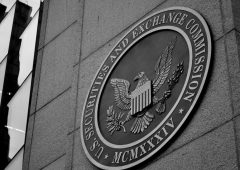South American Country Reiterates Crypto Restrictions Amid Worldcoin Trouble
16.08.2024 11:30 1 min. read
Worldcoin (WLD), the cryptocurrency project co-founded by Sam Altman of OpenAI, has stirred significant attention in Ecuador since its introduction in June.
However, this surge in interest has led local authorities to issue warnings regarding the project’s legitimacy and potential risks.
The Central Bank of Ecuador has recently reiterated its stance against the use of digital assets for transactions. Their statement follows Worldcoin’s launch of its World ID verification service, which became available at several locations in Quito and Guayaquil at the end of June. The service, which involves iris scanning for verification, has attracted many participants eager to earn Worldcoin tokens.
Reports from local media suggest that while Worldcoin has gained traction, some participants may not be fully aware of the implications of sharing their biometric data. Concerns have been raised about the transparency of the process and the potential for exploitation.
In addition, Ecuador’s new Data Protection Superintendency (DPS) has criticized Worldcoin for not informing authorities about its operations, citing a lack of resources to monitor such activities. The Superintendence of Companies (SOC) also cautioned the public about Worldcoin’s unregulated status and advised against providing biometric data for incentives.
The Central Bank of Ecuador emphasized that cryptocurrencies are not recognized as legal tender in the country and warned that transactions involving digital assets would be reported for further investigation.
-
1
Turkey Plans Law Allowing Watchdog to Freeze Crypto Accounts in AML Push
30.09.2025 13:00 1 min. read -
2
SEC Eyes Crypto Innovation Exemption as Lawmakers Debate Regulation
23.09.2025 18:25 2 min. read -
3
Armenia to Ban Cash-for-Crypto Deals in 2026, Pushes Transparency Over Suppression
03.10.2025 11:00 2 min. read -
4
Judge Rules Bored Ape NFTs and ApeCoin Are Not Securities
04.10.2025 14:00 2 min. read -
5
UK to Appoint ‘Digital Markets Champion’ to Lead Blockchain-Based Finance Reform
09.10.2025 10:00 1 min. read
Paris Cracks Down on Binance as France Pushes for EU Crypto Power
France’s financial watchdog has expanded its examination of Anti-Money Laundering (AML) practices across the cryptocurrency sector, with Binance and several other digital asset platforms reportedly under review.
Florida Bill Seeks to Allow Public Funds, Retirement System to Invest in Crypto
Florida legislators are pushing a bold plan to bring cryptocurrency into the state’s financial system.
SEC Chair Pushes for Crypto-Friendly Overhaul Amid Government Shutdown
SEC Chair Paul Atkins has outlined a vision for transforming the regulator into a catalyst for cryptocurrency innovation rather than a barrier.
U.S. Regulators Approve Preliminary Charter for Stablecoin-Ready Erebor Bank
Erebor Bank has received preliminary, conditional approval from the U.S. Office of the Comptroller of the Currency (OCC) to operate as a federally chartered bank, marking a major step for a crypto- and tech-focused lender backed by Palmer Luckey, Joe Lonsdale, and Peter Thiel.
-
1
Turkey Plans Law Allowing Watchdog to Freeze Crypto Accounts in AML Push
30.09.2025 13:00 1 min. read -
2
SEC Eyes Crypto Innovation Exemption as Lawmakers Debate Regulation
23.09.2025 18:25 2 min. read -
3
Armenia to Ban Cash-for-Crypto Deals in 2026, Pushes Transparency Over Suppression
03.10.2025 11:00 2 min. read -
4
Judge Rules Bored Ape NFTs and ApeCoin Are Not Securities
04.10.2025 14:00 2 min. read -
5
UK to Appoint ‘Digital Markets Champion’ to Lead Blockchain-Based Finance Reform
09.10.2025 10:00 1 min. read
On October 10, South Korea's Financial Services Commission (FSC) announced the establishment of a Virtual Asset Committee to consider the approval of cryptocurrency exchange-traded funds (ETFs).
South Korea and the United States are teaming up to tackle the growing threat of cryptocurrency theft through a groundbreaking research collaboration.
South Korea has taken another firm step in its crackdown on unregistered crypto platforms, this time targeting apps available to Apple users.
South Korea’s Financial Supervisory Service (FSS) is set to crack down on virtual asset exchanges, focusing on uncovering illegal or suspicious activities.
South Korea’s Financial Services Commission (FSC) is easing restrictions on cryptocurrency by allowing institutions to engage more with digital assets.
South Korea’s presidential race ended with a decisive win for Lee Jae Myung, who secured 49.42% of the vote on June 4, 2025.
South Korea just became the newest stop in RedotPay’s global crypto payment rollout.
South Korea's Financial Services Commission (FSC) has rolled out a new law aimed at bolstering the protection of virtual asset users, effective from July 19.
South Korea has confirmed that North Korea orchestrated the 2019 theft of 342,000 Ethereum (ETH) tokens from Upbit, initially worth $41.5 million and now valued at 1.47 trillion Won.
South Korea is working on amending its Foreign Exchange Transactions Act to require virtual asset service providers (VASPs) engaged in cross-border transactions to register and report user transaction details to the Bank of Korea.
South Korea's Financial Services Commission (FSC) is drafting a proposal to support the launch of spot crypto ETFs, aiming for release in the second half of 2025.
South Korea’s top financial regulator has ordered local exchanges to suspend their fast-growing crypto lending services, citing legal uncertainty and mounting risks for retail investors.
South Korea is moving forward with plans to enhance its cryptocurrency regulations, aiming to implement the next phase of its framework by late 2025.
South Korea's Democratic Party (KDP) has shifted its stance on the proposed crypto capital gains tax, now agreeing to delay its implementation for another two years, pushing the tax start date to 2027.
South Korean lawmakers have proposed pushing back the implementation of cryptocurrency capital gains taxes until 2028, citing current negative market sentiments.
South Korea's Democratic Party is moving forward with plans to implement a tax on crypto profits by 2025 but has proposed a significant adjustment to the tax rules.
South Korea’s Financial Supervisory Service (FSS) has summoned the nation’s top five cryptocurrency exchanges—Upbit, Bithumb, Coinone, Korbit, and Gopax—to address recent fee hikes amid new regulations.
As the U.S. explores groundbreaking moves in cryptocurrency under Donald Trump’s re-elected presidency, South Korea is adopting a cautious stance.
South Korea's data protection watchdog has stepped in to suspend the download of DeepSeek’s chatbot app following privacy concerns.
South Korea is intensifying its crackdown on overseas crypto exchanges operating without proper registration, targeting platforms like KuCoin, BitMEX, CoinW, Bitunix, and KCEX.


